Musicians & Groups Introduction
Note: This is only a selection of Native musicians, however, it does aim to reflect the "density" (Perea 2021) of Indigenous musicians of North America. The selection of musicians, books (in the "Books & Sheet Music" tab), and other sources can lead to learning about a range of other Indigenous musicians and musics. Tribal affiliations of each musician or group are in parentheses.
To access a list of materials for each musician or group, clicking on their name or photo will redirect you to the UNT Library Discover Catalog with a pre-filtered list of their works and contributions.
Reference:
Perea, J. B. (2021). Sound relations: Native ways of doing music history in Alaska. Oxford University Press.
We are always open to suggestions at the Music Library. If you have any recommendations for musicians you feel need to be represented in this guide, please email musicref@unt.edu. To suggest a purchase for new materials, please fill out our New Purchase Request/Recommendation form.
Musicians & Groups
Anderson, Delbert (Diné)

Delbert Anderson is a trumpet player who fuses new Diné melodies with jazz and funk styles as a means for cultural preservation. He has been featured in The New York times, Grammy.com, PBS, Smithsonian Magazine, TEDx, and more. Anderson has collaborated with Pura Fé, Julia Keefe, Mali Obomsawin, Nicholas Lucero, and more.
Bio and image source:
Anderson, Delbert. (n.d.). Delbert Anderson website. https://delbertanderson.com/
 Dawn Avery is a cellist, vocalist, composer, and educator, who has worked with Luciano Pavarotti, Sting, Philip Glass, John Cage, John Cale, David Darling, Glen Velez, R. Carlos Nakai, Soldier String Quartet, Grover Washington, Jr., Joy Harjo, Karsh Kale, Larry Mithcell, Shelley Morningsong, and Joanne Shenandoah. Her own works highlight her incorporation of her Mohawk heritage in language into her craft. Avery has toured with the North American Indian Cello Project, which pemiers contemporary classical works by Native composers. She is a participant of Longhouse ceremonies.
Dawn Avery is a cellist, vocalist, composer, and educator, who has worked with Luciano Pavarotti, Sting, Philip Glass, John Cage, John Cale, David Darling, Glen Velez, R. Carlos Nakai, Soldier String Quartet, Grover Washington, Jr., Joy Harjo, Karsh Kale, Larry Mithcell, Shelley Morningsong, and Joanne Shenandoah. Her own works highlight her incorporation of her Mohawk heritage in language into her craft. Avery has toured with the North American Indian Cello Project, which pemiers contemporary classical works by Native composers. She is a participant of Longhouse ceremonies.
Bio and image source:
World music cellist, composer, vocalist: Dawn Avery. Dawn Avery. (n.d.). https://www.dawnavery.com/
Bailey, Mildred (Coeur d’Alene) (1907-1951)
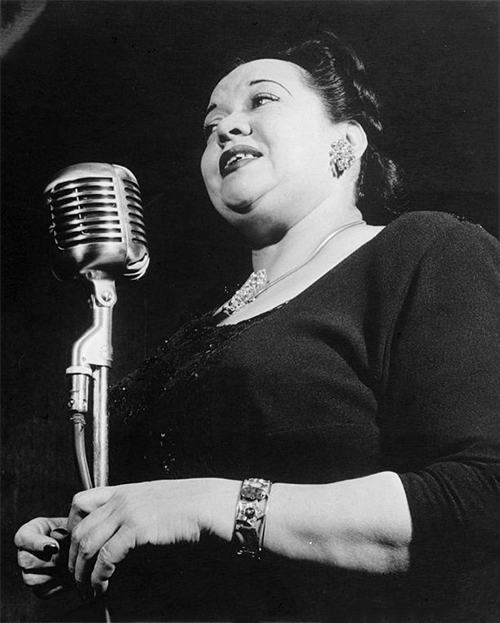
Mildred Bailey was a swing singer from the 1920s through the 1940s, and one of the best. In a public opinion poll in the liner notes of a Billie Holiday album, Bailey was ranked number one, above Holiday and Ella Fitzgerald. “Mrs. Swing”, as she was known, recorded with Benny Goodman, Coleman Hawkins, Paul Whiteman, Gene Krupa, the Dorsey Brothers, Red Norvo, and more. She greatly influenced Bing Crosby and a then emerging generation of vocalists, such as Frank Sinatra and Tony Bennett.
Bio and image source:
Allaboutjazz.com. (n.d.). Mildred Bailey musician - all about jazz. All About Jazz Musicians. https://www.allaboutjazz.com/musicians/mildred-bailey/
Mildred Bailey’s Native American Roots. Bibliolore. (2019, December 15). https://bibliolore.org/2017/02/27/mildred-baileys-native-american-roots/
Ballard, Louis W. (Quapaw, Cherokee) (1931-2007)
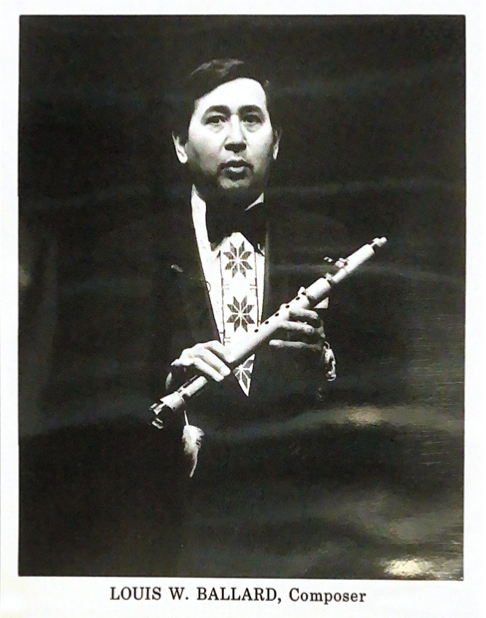
Louis W. Ballard was a composer and music educator known for his synthesis of traditional Native American and Western classical music. Ballard had a national presence, mostly for his compositions, which were also performed in Germany and Austria. He directed the music and performing arts programs at the Institue of American Indian Arts (IAIA) upon its opening in 1962 and produced many compositions during his time there, such as the ballets Koshare (c.1965) and The Four Moons (1967). Ballard was also a curriculum specialist at the Bureau of Indian Affairs (BIA) from 1969-1979; during his time there, he composed the woodwind quartet Ritmo Indio (1969), woodwind octet Desert Trilogy (1971), and chamber orchestra piece Incident at Wounded Knee (1974).
As an educator, Ballard published American Indian Music for the Classroom (1973), which included a teacher’s guide and classroom instructional materials featuring Native music recordings, and scores He was an active member of the War Dance Society of the Quapaw and active member of the Native community. Ballard studied privately with composers Darius Milhaud, Mario Castelnnuovo-Tedesco, Carlos Surinach, and Felix Labunski. He also earned two Bachelor’s degrees (music, music education) and a master's degree in music composition from the University of Tulsa.
Bio and image source:
Louis W. Ballard gallery. Louis W. Ballard composer. (n.d.). https://www.lwballard.com/gallery
Perea, J.-C. (2024, May 6). Louis Ballard. Encyclopaedia Britannica. https://www.britannica.com/biography/Louis-Ballard
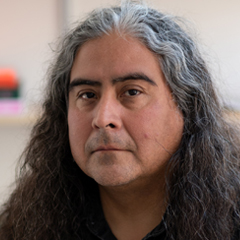
Raven Chacon is a composer and visual artist. His 2021 work Voiceless Mass, for pipe organ and ensemble, earned him the Pulitzer Prize for Music in 2022 and he became a MacArthur Fellow in 2023. Chacon’s works “explore relationships among sound, space, and people.” When composing, he combines Western music notation with other symbols, concepts, and instruction. Chacon frequently addresses settler colonialism in the U.S. with works like Sweet Land and American Ledger (No. 1).
Image: © John D. and Catherine T. MacArthur Foundation–used with permission.
Bio and image source: Raven Chacon. MacArthur Foundation. (2023). https://www.macfound.org/fellows/class-of-2023/raven-chacon
 Connor Chee is a pianist who combines his classical piano training with his Native heritage. His albums include original pieces and transcriptions of Navajo music. Chee’s album The Navajo Piano (2014) won Best Instrumental Recording at the 16th Annual Native American Music Awards, and his piece “Beginnings” won Best New Age Song. Scenes from Dinétah (2020) is accompanied by Navajo filmmaker Michael Etcitty Jr.’s music videos, filmed on the reservation.
Connor Chee is a pianist who combines his classical piano training with his Native heritage. His albums include original pieces and transcriptions of Navajo music. Chee’s album The Navajo Piano (2014) won Best Instrumental Recording at the 16th Annual Native American Music Awards, and his piece “Beginnings” won Best New Age Song. Scenes from Dinétah (2020) is accompanied by Navajo filmmaker Michael Etcitty Jr.’s music videos, filmed on the reservation.
Bio and image source:
About. Connor Chee, Navajo pianist. (n.d.). https://www.connorchee.com/
Cherry, Don (Choctaw) (1936-1995)
 Don Cherry created his own unique pan-Indigenous and futuristic sounds in the avant-garde jazz world. He was also known for being the complimentary pocket trumpet/cornet player to free jazz innovator Ornette Coleman. Other instruments Cherry has played include various flutes (including a Taos flute on the title track for 1974’s Blue Lake), gamelan, n’goni, piano, tambura, etc. Cherry and John Coltrane co-led on 1966’s The Avant-Garde. He was also in the band Old and New Dreams with Dewey Redman, Charlie Haden, and Ed Blackwell, as well as Cadona, with Naná Vasconcelos and Collin Walcott. Additionally, Cherry has recorded with Albert Ayler, Sonny Rollins, Abdullah Ibrahim (formerly known as Dollar Brand), Terry Riley, Lou Reed. Archie Shepp, Steve Lacy, Billy Higgins, Ed Blackwell, Carlos Ward, Sun Ra, the New York Contemporary Five, Jim Pepper, Clifford Jordan, Carla Bley, Paul Bley, and many more.
Don Cherry created his own unique pan-Indigenous and futuristic sounds in the avant-garde jazz world. He was also known for being the complimentary pocket trumpet/cornet player to free jazz innovator Ornette Coleman. Other instruments Cherry has played include various flutes (including a Taos flute on the title track for 1974’s Blue Lake), gamelan, n’goni, piano, tambura, etc. Cherry and John Coltrane co-led on 1966’s The Avant-Garde. He was also in the band Old and New Dreams with Dewey Redman, Charlie Haden, and Ed Blackwell, as well as Cadona, with Naná Vasconcelos and Collin Walcott. Additionally, Cherry has recorded with Albert Ayler, Sonny Rollins, Abdullah Ibrahim (formerly known as Dollar Brand), Terry Riley, Lou Reed. Archie Shepp, Steve Lacy, Billy Higgins, Ed Blackwell, Carlos Ward, Sun Ra, the New York Contemporary Five, Jim Pepper, Clifford Jordan, Carla Bley, Paul Bley, and many more.
Bio and image source:
Blue Note. (n.d.). Don Cherry - Blue Note Records. Bluenote.com. https://www.bluenote.com/artist/don-cherry/
stock images, editorial and creative photos | picture agency I. (2019, January 2). Don Cherry, 25th anniversary of his death on October 19th. IMAGO. https://www.imago-images.com/offers/397291/Archive/Entertainment/Don-Cherry,-25th-anniversary-of-his-death-on-October-19-?db=stock&type=kalender
 Samantha Crain is a singer/songwriter from Shawnee, Oklahoma. She has written in the Choctaw language on several songs, including “When We Remain” and “Red Sky, Blue Mountain.” Crain has won three NAMMYs (Native American Music Awards) and an Indigenous Music Award (Canada). Her music has been featured on shows and movies including Reservation Dogs, Resident Alien, Marvel’s Echo, Barking Water, Hung, 90210, The Dark Divide, and Unreserved: The Work of Louie Gong. Crain worked with the Peabody Essex Museum in Salem, Massachusetts, to compose and contribute music for an exhibit on Kiowa artist T.C. Cannon. She also composed the music score for Fancy Dance, a film featuring Lily Gladstone. Crain released a collection of her sonnets in 2018.
Samantha Crain is a singer/songwriter from Shawnee, Oklahoma. She has written in the Choctaw language on several songs, including “When We Remain” and “Red Sky, Blue Mountain.” Crain has won three NAMMYs (Native American Music Awards) and an Indigenous Music Award (Canada). Her music has been featured on shows and movies including Reservation Dogs, Resident Alien, Marvel’s Echo, Barking Water, Hung, 90210, The Dark Divide, and Unreserved: The Work of Louie Gong. Crain worked with the Peabody Essex Museum in Salem, Massachusetts, to compose and contribute music for an exhibit on Kiowa artist T.C. Cannon. She also composed the music score for Fancy Dance, a film featuring Lily Gladstone. Crain released a collection of her sonnets in 2018.
Bio and image source:
Samantha Crain. Wikipedia. (2024, July 11). https://en.wikipedia.org/wiki/Samantha_Crain
Samantha Crain. (n.d.). https://www.samanthacrain.com/
Davids, Brent Michael (Mohican, Munsee-Lenape)
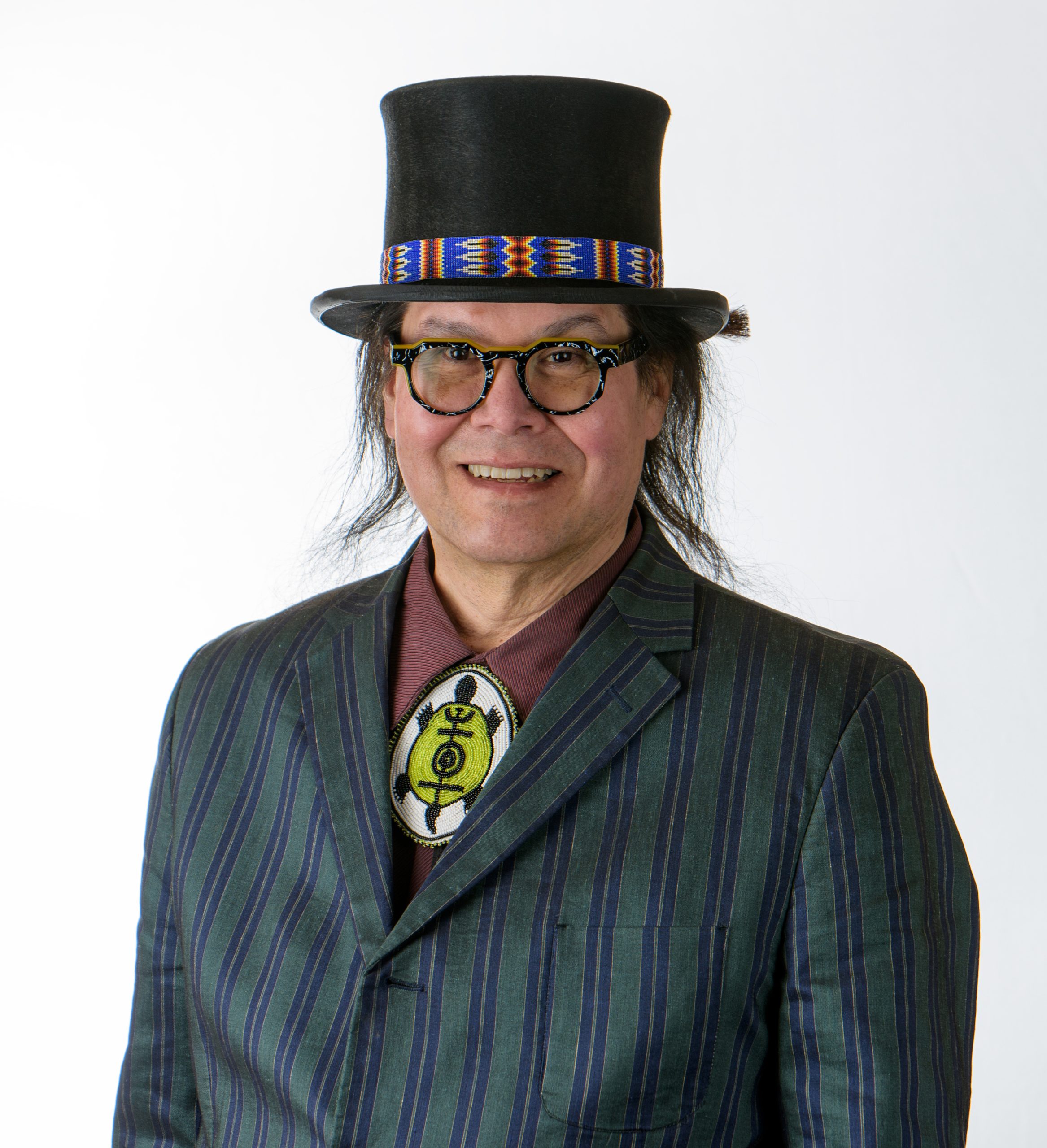 Brent Michael Davids is a classical composer, performer of Native instruments and styles, and “music warrior of Native equity and parity.” Over five decades, Davids’ works have been premiered across North American, Europe, and Asia. In 2011, he took a month-long tour to Russia as part of the US-Russia Bilateral Presidential Commision. Davids has collaborated with or had his works performed by the Porcupine Singers, Kronos Quartet, Maza Kute Singers, National Symphony Orchestra, Chanticleer, South Dakota Symphony, Anna Maria Cardinalli-Padilla, New Mexico Symphony and Chorus, Valerie Martinez, Mankato Symphony Orchestra, and Phoenix Symphony. As a film composer, he has scored Bring Her Home (2020), The People’s Protectors (2018), Lake of Betrayal (2017), The Mayors of Shiprock (2017), Viva Diva (2107), Waabooz (2016), Iroquois Creation Story (2015), The Jingle Dress Tradition (2015), By Our Nature (2015), Living With the Land (2012), Valor’s Kids (2011), Opal (2011), Raccoon & Crawfish (2007), The 1920 Last of the Mohicans (2003), World of American Indian Dance (2003), The Business of Fancy Dancing (2002), The Silent Enemy (1996), and Bright Circle (2006). Davids co-founded the Native American Composer Apprentice Project (NACAP) in Arizona and Composer Apprentice National Outreach Endeavor (CANOE) in Minnesota and Wisconsin to teach Native youth to compose written concert music. He has also been recognized with many awards; to name one, Davids was selected along with Leonard Bernstein, Stephen Foster, and 25 others in the National Endowment for the Arts’ project “American Masterpieces: Three Centuries of Artistic Genius.”
Brent Michael Davids is a classical composer, performer of Native instruments and styles, and “music warrior of Native equity and parity.” Over five decades, Davids’ works have been premiered across North American, Europe, and Asia. In 2011, he took a month-long tour to Russia as part of the US-Russia Bilateral Presidential Commision. Davids has collaborated with or had his works performed by the Porcupine Singers, Kronos Quartet, Maza Kute Singers, National Symphony Orchestra, Chanticleer, South Dakota Symphony, Anna Maria Cardinalli-Padilla, New Mexico Symphony and Chorus, Valerie Martinez, Mankato Symphony Orchestra, and Phoenix Symphony. As a film composer, he has scored Bring Her Home (2020), The People’s Protectors (2018), Lake of Betrayal (2017), The Mayors of Shiprock (2017), Viva Diva (2107), Waabooz (2016), Iroquois Creation Story (2015), The Jingle Dress Tradition (2015), By Our Nature (2015), Living With the Land (2012), Valor’s Kids (2011), Opal (2011), Raccoon & Crawfish (2007), The 1920 Last of the Mohicans (2003), World of American Indian Dance (2003), The Business of Fancy Dancing (2002), The Silent Enemy (1996), and Bright Circle (2006). Davids co-founded the Native American Composer Apprentice Project (NACAP) in Arizona and Composer Apprentice National Outreach Endeavor (CANOE) in Minnesota and Wisconsin to teach Native youth to compose written concert music. He has also been recognized with many awards; to name one, Davids was selected along with Leonard Bernstein, Stephen Foster, and 25 others in the National Endowment for the Arts’ project “American Masterpieces: Three Centuries of Artistic Genius.”
Bio and image source:
About. Brent Michael Davids. (n.d.). https://filmcomposer.us/about/
Davis, Jesse Ed (Kiowa, Comanche) (1944-1988)

Jesse Ed Davis was one of the premiere sideman and session guitarists of his time. He was an integral part of Taj Mahal’s early recordings and band. He released 3 albums of his own in the early 70s. Contributors included Eric Clapton, Leon Russell, Dr. John, and Jim Keltner. Davis also produced the Byrd’s Gene Clark’s solo debut album. He was also a multi-faceted player whose slide guitar playing inspired Duane Allman to play slide guitar, blues playing attracted collaborations with blues legends John Lee Hooker, B.B. King, Lightnin’ Hopkins, and Albert King, and more. Davis frequently collaborated with John Lennon and George Harrison (including as a participant in Harrison and Ravi Shankar's Concert for Bangladesh) and played with all four Beatles in some capacity. Davis and Dakota poet activist John Trudell formed the band Graffiti Man in 1985. Bob Dylan, another collaborator of Davis’, regarded their album A.K.A. Graffiti Man as the best of 1986. Davis also collaborated with Neil Diamond, Robbie Robertson, Ry Cooder, Billy Preston Neil Young, Jackson Browne, Leonard Cohen, Peter Frampton, Buffy Sainte-Marie, Rod Stewart, the Brecker Brothers, the Pinter Sisters, Charles Lloyd, Pete Seeger, Steve Cropper, Keith Moon, Arl Gutherie Ben Sidran, the Steve Miller Band, and Conway Twitty.
Bio and image source:
Obrecht, J. (2010). Jesse Ed Davis: I Just Play The Notes That Sound Good. Duane Allman info. https://www.duaneallman.info/jasobrecht/jesseeddavis/jesseeddavis.htm
 Lila Downs is a vocalist and songwriter from the state of Oaxaca México. She sings in the languages of the Mixtec, Zapotec, Maya, and Nahuatl cultures, as well as in Spanish and English. Her versatile style and unique voice covers and extends beyond the blues, cumbia, rancheras, corridos, American folk, boleros, jazz, hip hop, etc. She has collaborated with Mercedes Sosa, Santana, Carlos Santana, Juanes, Bunbury, Cafe Tacuba, Los Tigres del Norte, Norah Jones, 1 Giant Leap, Wynton Marsalis, La Niña Pastori, Angelique Kidjo, the Chicago Symphony Orchestra, Kevin Johansen and Juan Gabriel, and many more. She has been nominated for nine Grammy awards and has won six.
Lila Downs is a vocalist and songwriter from the state of Oaxaca México. She sings in the languages of the Mixtec, Zapotec, Maya, and Nahuatl cultures, as well as in Spanish and English. Her versatile style and unique voice covers and extends beyond the blues, cumbia, rancheras, corridos, American folk, boleros, jazz, hip hop, etc. She has collaborated with Mercedes Sosa, Santana, Carlos Santana, Juanes, Bunbury, Cafe Tacuba, Los Tigres del Norte, Norah Jones, 1 Giant Leap, Wynton Marsalis, La Niña Pastori, Angelique Kidjo, the Chicago Symphony Orchestra, Kevin Johansen and Juan Gabriel, and many more. She has been nominated for nine Grammy awards and has won six.
Image and bio source:
About. Lila Downs. (n.d.). https://www.liladowns.com/language/en/about/
Lila Downs. CU Presents. (n.d.). https://cupresents.org/artist/14/lila-downs/
Dutcher, Jeremy (Wolastoqiyik)
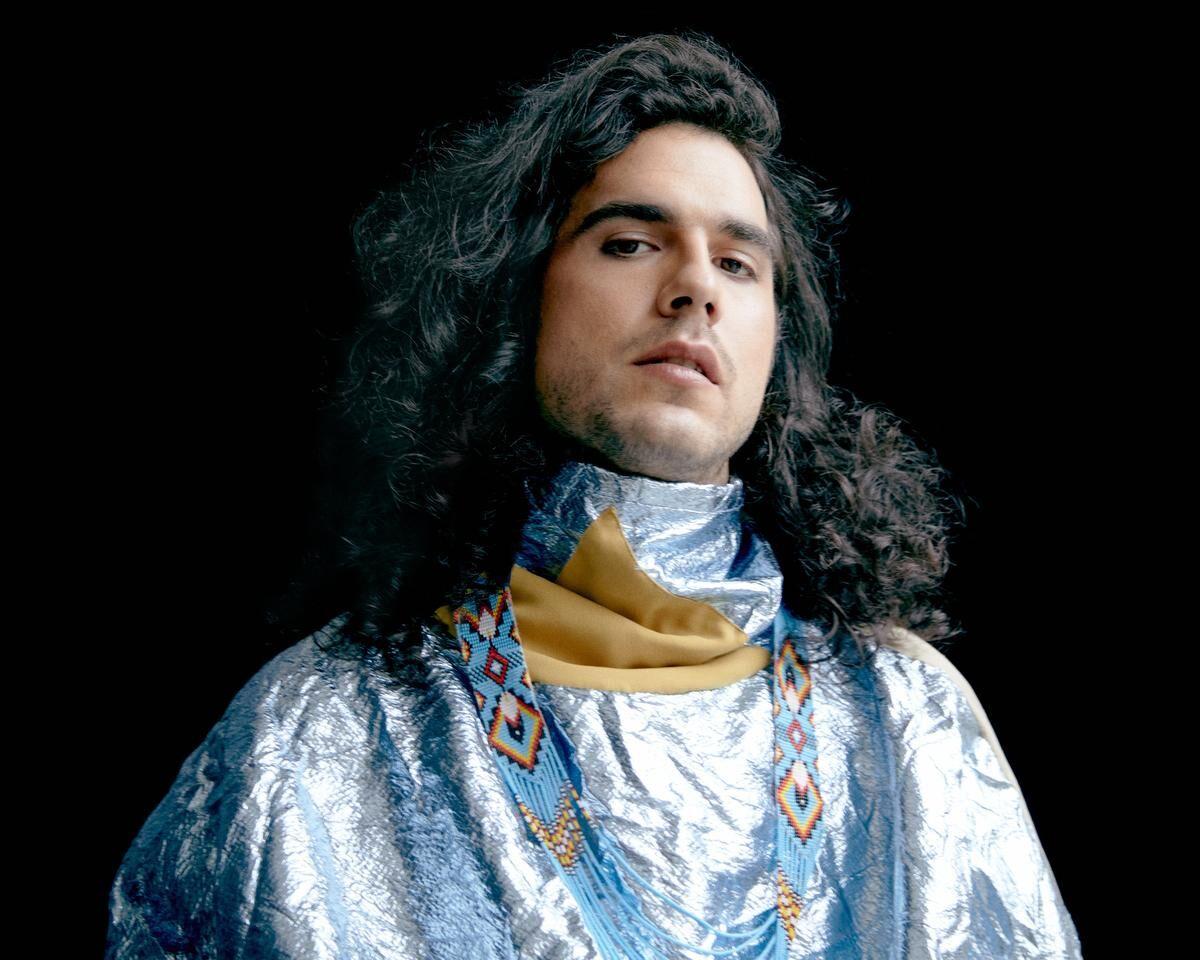 Jeremy Dutcher is a vocalist, composer, and activist who revitalizes his Wolastoqey language through song. His 2018 debut, Wolastoqiyik Lintuwakonawa, displays his operatic vocal style. The Polaris Prize and JUNO award-winning album is based on his research of early recordings of traditional Wolastoqiyik songs on wax cylinders and the mentorship of community elder Maggie Paul. 2023’s Motewolonuwok includes Wolastoqey and English works highlighting Indigenous stories and culture. Dutcher is two-spirirt. He has collaborated with Beverly Glenn-Copeland and Yo-Yo Ma.
Jeremy Dutcher is a vocalist, composer, and activist who revitalizes his Wolastoqey language through song. His 2018 debut, Wolastoqiyik Lintuwakonawa, displays his operatic vocal style. The Polaris Prize and JUNO award-winning album is based on his research of early recordings of traditional Wolastoqiyik songs on wax cylinders and the mentorship of community elder Maggie Paul. 2023’s Motewolonuwok includes Wolastoqey and English works highlighting Indigenous stories and culture. Dutcher is two-spirirt. He has collaborated with Beverly Glenn-Copeland and Yo-Yo Ma.
Image and bio source:
Allaire, C. (2023, October 23). Jeremy Dutcher is the Indigenous singer with powerful performance style. Vogue. https://www.vogue.com/article/jeremy-dutcher-indigenous-singer-performance-style
Assaly, R. (2023, November 22). The Radical Art of Jeremy Dutcher: Wolastoqiyik Singer tackles new musical territory. Toronto Star. https://www.thestar.com/entertainment/music/the-radical-art-of-jeremy-dutcher-wolastoqiyik-singer-tackles-new-musical-territory/article_9df6f473-5fd9-5126-86e0-a586afba844c.html
 Elisapie is a singer-songwriter, actress, and activist from the Nunavik region of Quebec. She first started performing with the famous Inuit rock band Sugluk (aka Salluit Band), which her uncles were a part of. Elisapie has performed with the Orchestre Métropolitain de Montréal to the invitation of Yannick Nézet-Séguin and at NPR Tiny Desk. Her first album in 2004, Taima, (released under her band at the time, Taima) won a JUNO Award and her 2018 album The Ballad of the Runaway Girl was shortlisted for a Polaris Prize. Her 2023 album Inuktitut featured classic rock and pop covers in her mother tongue, Inuktitut.
Elisapie is a singer-songwriter, actress, and activist from the Nunavik region of Quebec. She first started performing with the famous Inuit rock band Sugluk (aka Salluit Band), which her uncles were a part of. Elisapie has performed with the Orchestre Métropolitain de Montréal to the invitation of Yannick Nézet-Séguin and at NPR Tiny Desk. Her first album in 2004, Taima, (released under her band at the time, Taima) won a JUNO Award and her 2018 album The Ballad of the Runaway Girl was shortlisted for a Polaris Prize. Her 2023 album Inuktitut featured classic rock and pop covers in her mother tongue, Inuktitut.
Image and bio source:
Elisapie. Bonsound. (n.d.). https://www.bonsound.com/en/artist/elisapie/
 Joy Harjo is a poet, author, creative writer, speaker, activist, and musician, playing alto saxophonist and cedar flutist. She is the 23rd Poet Laureate of the United States, the inaugural Artists-in-Residence of the Bob Dylan Center in Tulsa, Oklahoma, as well as the 2024 Frost Medalist, among a plethora other awards. Joy has performed internationally and performed with Larry Mitchell, Rene Camacho, Oliver Lake, Michael Davis from MC5, Keith Stoutenberg, among many more. She has released seven albums and has written several memoirs, a children’s book, and many collections of her poems.
Joy Harjo is a poet, author, creative writer, speaker, activist, and musician, playing alto saxophonist and cedar flutist. She is the 23rd Poet Laureate of the United States, the inaugural Artists-in-Residence of the Bob Dylan Center in Tulsa, Oklahoma, as well as the 2024 Frost Medalist, among a plethora other awards. Joy has performed internationally and performed with Larry Mitchell, Rene Camacho, Oliver Lake, Michael Davis from MC5, Keith Stoutenberg, among many more. She has released seven albums and has written several memoirs, a children’s book, and many collections of her poems.
Image and bio source:
Joy Harjo. (n.d.). https://www.joyharjo.com/
The Halluci Nation (Mohawk, Cayuga)
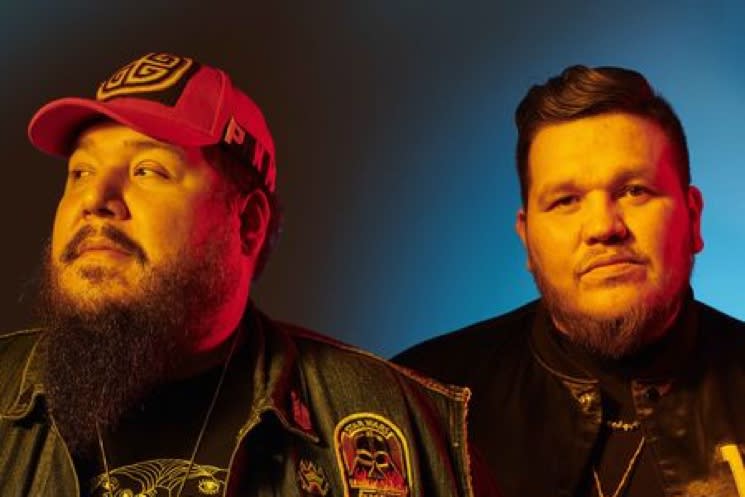
Image and bio awards:
Huson, A. (n.d.). A tribe called red change their name to the Halluci Nation. A Tribe Called Red Change Their Name to the Halluci Nation │ Exclaim! https://exclaim.ca/music/article/a_tribe_called_red_change_their_name_to_the_halluci_nation
The Halluci Nation. Wikipedia. (2024, May 15). https://en.wikipedia.org/wiki/The_Halluci_Nation#cite_note-urbanpowwow-2
Keefe, Julia (Nez Perce)
.png) Julia Keefe is a jazz vocalist, actor, activist, and educator in New York City. It is her life-long project to revive and honor the work of the great Swing vocalist Mildred Bailey (Coeur d’Alene). Her most recent recording is her 2020 EP, Nobody Else But Me. She also directs her group, the Julia Keefe Indigenous Big Band, which highlights the past and future of Indigenous People in Jazz. Sterlin Harjo’s (Seminole, Muscogee) 2020 film Love and Fury featured Keefe. She taught at Gonzaga University and earned her master's in music from the Manhattan School of Music. Keefe has also opened for Tony Bennett and Esperanza Spalding and performed with Jim McNeely, Emmet Cohen, Dan Haerle, and the Lionel Hampton Big Band.
Julia Keefe is a jazz vocalist, actor, activist, and educator in New York City. It is her life-long project to revive and honor the work of the great Swing vocalist Mildred Bailey (Coeur d’Alene). Her most recent recording is her 2020 EP, Nobody Else But Me. She also directs her group, the Julia Keefe Indigenous Big Band, which highlights the past and future of Indigenous People in Jazz. Sterlin Harjo’s (Seminole, Muscogee) 2020 film Love and Fury featured Keefe. She taught at Gonzaga University and earned her master's in music from the Manhattan School of Music. Keefe has also opened for Tony Bennett and Esperanza Spalding and performed with Jim McNeely, Emmet Cohen, Dan Haerle, and the Lionel Hampton Big Band.
Source: Julia Keefe website
Keefe, J. (n.d.). Julia Keefe website. Julia Keefe. https://www.juliakeefe.com/
 From Taos Pueblo, New Mexico, Robert Mirabal is a multi-instrumentalist known for his traditional flute playing and his unique contemporary music style, informed by his Taos identity, Indigenous and folk music styles all over the world, hip-hop, funk, R&B, rock, jazz and classical music, to name a few. His PBS special and album Music from a Painted Cave earned him mass acclaim for its revolutionary tribal rock sound. Mirabal has toured and recorded with the string quartet ETHEL (2016’s River), recorded with Mohican singer-songwriter Bill Miller (1996’s Native Suite: Chants, Dances, and the Remembered Earth), and collaborated with Japanese avant-garde dance duo, Eiko and Koma, for the tour of his music from Land (1995).
From Taos Pueblo, New Mexico, Robert Mirabal is a multi-instrumentalist known for his traditional flute playing and his unique contemporary music style, informed by his Taos identity, Indigenous and folk music styles all over the world, hip-hop, funk, R&B, rock, jazz and classical music, to name a few. His PBS special and album Music from a Painted Cave earned him mass acclaim for its revolutionary tribal rock sound. Mirabal has toured and recorded with the string quartet ETHEL (2016’s River), recorded with Mohican singer-songwriter Bill Miller (1996’s Native Suite: Chants, Dances, and the Remembered Earth), and collaborated with Japanese avant-garde dance duo, Eiko and Koma, for the tour of his music from Land (1995).
Bio and image source:
Robert Mirabal. Robert Mirabal: New Mexico Tech. (n.d.). https://www.nmt.edu/pas/2020-2021/robert-mirabal.php
Romero, A. (2017, November 22). Artist profiles: Robert Mirabal: World Music Central. World Music Central | Your Connection to traditional and contemporary World Music, including folk, roots, global music, ethno and crosscultural fusions. https://worldmusiccentral.org/artist-profiles-robert-mirabal/robert_mirabal_1/
Moore, Russell (Akimel O’odham) (1912-1983)
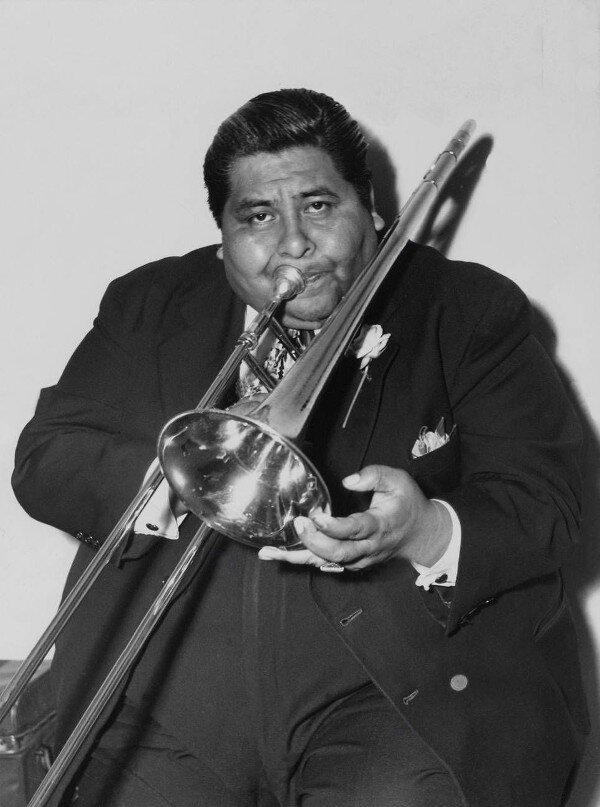
Russell Moore (also commonly known as “Big Chief”) was a trombonist from the Gila River Indian Community, south of Phoenix, Arizona. He was a part of Louis Armstrong’s last big band in 1944 (which included an appearance in the movie New Orleans with Billie Holiday), with Armstrong’s sextet for a world tour in 1964, and played with Lionel Hampton’s big band, Oscar “Papa” Celestin, Charlie Parker, Miles Davis, and Sidney Bechet. during his 50-year career. Moore devoted much of his life to his Native community and mentoring Native youth; a free Russell Moore Music Fest was held at the Gila River Indian for years. In 1982, the Kennedy Center recognized with a “First American in the Arts” award; his performance of his composition Wounded Knee Chant merited the only standing ovation of the night.
Image and bio source:
Shaw, L. (2021, February 11). Russell “big chief” Moore: Stellar Native American Jazzman. The Syncopated Times. https://syncopatedtimes.com/russell-big-chief-moore-stellar-native-american-jazzman/
Nakai, R. Carlos (Navajo/ Diné, Ute) (b. 1946)

R. Carlos Nakai is a leading innovator in cedar flute improvising. He has released over fifty albums in the past four decades and is an eleven-time Grammy nominee. He has also worked with various orchestral and classical groups and performed solo throughout the U.S., Europe and Japan. Nakai frequently collaborates with William Eaton, Will Clipman, Mary Redhouse (Diné), Am Chip Dabney, Peter Kater, and James DeMars. Nakai aims to evoke Native culture and community in a way that transcends stereotypes. He has also worked with the Wind Travelin’ Band, Nawang Khechog, the Black Lodge Singers, Keola Beamer, Randy Wood, Xavier Quijas Yxayotl, Mark Sunkett, Paul Horn, Udi Bar-David, and Philip Glass.
Image and bio source:
R. Carlos Nakai website. (2022, July 26). https://rcarlosnakai.com/
Naranjo, Valerie (Ute, Navajo/Diné) (b. 1958)
 Valerie Naranjo is a percuassionist, most famously as the longtime percussionist for NBC’s Saturday Night Live band and The Lion King on Broadway. She has also recorded and performed with the Philip Glass Ensemble, David Byrne, the Paul Winter Consort, Tori Amos, Airto Moreira, Milton Cardona, Zakir Hussain, and Glen Velez. Her album Orenda (2000) focused on music from her Native experience. Naranjo is an expert in the gyil. Her playing led to the uplifting of a ban on women playing the gyil in its originating community in upper West Ghana.
Valerie Naranjo is a percuassionist, most famously as the longtime percussionist for NBC’s Saturday Night Live band and The Lion King on Broadway. She has also recorded and performed with the Philip Glass Ensemble, David Byrne, the Paul Winter Consort, Tori Amos, Airto Moreira, Milton Cardona, Zakir Hussain, and Glen Velez. Her album Orenda (2000) focused on music from her Native experience. Naranjo is an expert in the gyil. Her playing led to the uplifting of a ban on women playing the gyil in its originating community in upper West Ghana.
Image and bio source:
Valerie Naranjo. Percussive Arts Society. (2024, April 24). https://pas.org/valerie-naranjo/
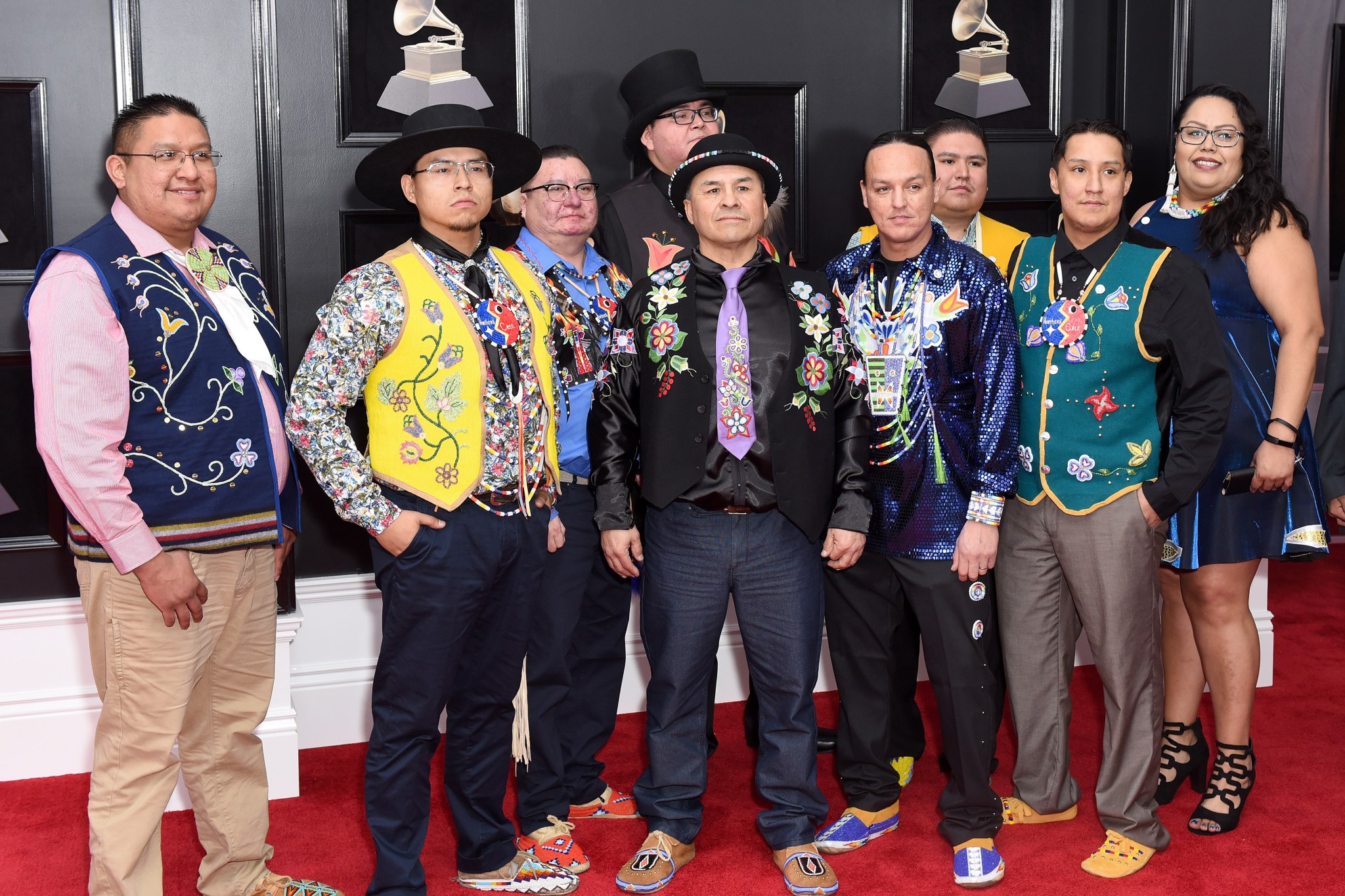
Northern Cree (Cree)
The Northern Cree Singers are one of the most known groups in powwow music today. They are nine-time Grammy and two-time JUNO Award nominees.
Source: Global News
Boles, D. (2020, January 25). Alberta indigenous band Northern Cree seeking 1st Grammy Win. 880 Edmonton. https://globalnews.ca/news/6462031/alberta-indigenous-band-northern-cree-grammy-awards/

Mali Obomsawin’s debut solo album, Sweet Tooth (2022) earned her a spot on the Grammy’s Top 10 Emerging Jazz Artists to Watch list. The album honors Wabanaki culture through the unique intersection of Wabanaki song and avant-garde jazz. Her band Deerlady with guitarist Magdalena Abrego released Greatest Hits in 2024. Obomsawin also teamed up with folk musician Jake Blount for the collaborative album symbiont (2024), including a rendition of "Old Indian Hymn" Thomas Commuck (Narragansett). The bassist, composer, vocalist, activist, writer, and educator has also recorded with the folk-rock band Lula Wiles on Smithsonian Folkways Recordings. Obomsawin has worked with Esperanza Spalding, Taylor Ho Bynum, Peter Apfelbaum, Lizzie No, Bill Cole’s Untempered Ensemble, the Julia Keefe Indigenous Big Band, members of the Sun Ra Arkestra, Mary Halverson, Joe Rainey, Nicole Mitchell, Tomeka Reid, and Tomas Fujiwara.
Source: Mali Obomsawin website
Obomsawin, M. (n.d.). Mali Obomsawin website. MALI OBOMSAWIN. https://www.maliobomsawin.com/
Paul, Katherine (Swinomish, Iñupiaq)
 Under the name Black Belt Eagle Scout, Paul is a guitarist and singer-songwriter. Her music can be characterized as alternative rock but also includes traditional Native music and other pop, rock, and electronic styles. 2023’s The Land, the Water, the Sky is inspired by the beauty of returning home to her homelands.
Under the name Black Belt Eagle Scout, Paul is a guitarist and singer-songwriter. Her music can be characterized as alternative rock but also includes traditional Native music and other pop, rock, and electronic styles. 2023’s The Land, the Water, the Sky is inspired by the beauty of returning home to her homelands.
Image and bio source:
Home. Black Belt Eagle Scout. (n.d.). https://www.blackbelteaglescout.com/
Pepper, Jim (Muscogee Creek, Kaw) (1941-1992)

Saxophonist Jim Pepper was an innovator of the post-Coltrane and jazz-rock sound movements. He was also known for his incorporation of traditional Native music into jazz (with support from Don Cherry and Ornette Coleman). Pepper’s “Witchi Tai To”, a peyote song from the Native American Church, became a major hit and, besides his many versions, was recorded by the likes of The Supremes, Keith Moon, Yes, Jan Garbarek, Don Cherry, and Oregon. Pepper has recorded with Paul Motian, Charlie Haden, John Scofield, Joe Lovano, Don Cherry, Bill Frisell, Billy Cobham, Chuck Rainey, Dewey Redman, Larry Coryell, Kenny Werner, Bob Moses, Hamid Drake, Naná Vasconcelos, Collin Walcott, Mark Helias, Ed Schuller, Danny Gottlieb, and Mal Waldron. He was a member of The Free Spirits, considered the first jazz-rock band.
Source:
Photo Source: Jim Pepper fan website.
Perea, John-Carlos (Mescalero Apache)
 John-Carlos Perea is an electric bassist, singer, cedar flutist, composer, and ethnomusicologist. His research interests include “jazz and improvised music performance and composition, urban American Indian lived experiences and cultural productions, music technologies, recording and archiving practices, social construction of ‘noise,’ Native and African American jazz cultures, and the Creek and Kaw saxophonist Jim Pepper.” He has recorded three albums as a leader: First Dance (2001), Creation Story (2014), and Cedar Flute Songs (2023). He was awarded a Grammy for his vocal, powwow drum, and cedar flute contributions to the 2007 Paul Winter Consort album Crestone.
John-Carlos Perea is an electric bassist, singer, cedar flutist, composer, and ethnomusicologist. His research interests include “jazz and improvised music performance and composition, urban American Indian lived experiences and cultural productions, music technologies, recording and archiving practices, social construction of ‘noise,’ Native and African American jazz cultures, and the Creek and Kaw saxophonist Jim Pepper.” He has recorded three albums as a leader: First Dance (2001), Creation Story (2014), and Cedar Flute Songs (2023). He was awarded a Grammy for his vocal, powwow drum, and cedar flute contributions to the 2007 Paul Winter Consort album Crestone.
Bio and image source:
John-Carlos Perea. (n.d.). https://www.johncarlosperea.com/
Pettiford, Oscar (Choctaw, Cherokee) (1922-1937)
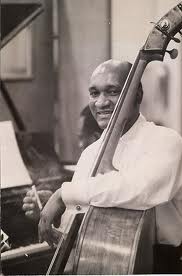 Born in Okmulgee, Oklahoma, Oscar Pettiford was an innovative jazz bassist and cellist. He grew up playing for his father in Oklahoma in Minnesota and, upon arriving in New York 1943, went on to perform and record with “who’s who” of the New York scene in the 40s and 50s including Duke Ellington, Dizzy Gillespie, Thelonious Monk, Miles Davis, Coleman Hawkins, Roy Eldridge, Max Roach, Kenny Clarke, Erroll Garner, Bud Powell, Charles Mingus, Lester Young, Milt Jackson, Stan Getz, and Dexter Gordon. Christian McBride cites Pettiford as “probably the most important bass player of that bebop generation in terms of creating new language for the bass.” Pettiford is recognized as having introduced the cello into the jazz community; it can be heard on many of his solo recordings.
Born in Okmulgee, Oklahoma, Oscar Pettiford was an innovative jazz bassist and cellist. He grew up playing for his father in Oklahoma in Minnesota and, upon arriving in New York 1943, went on to perform and record with “who’s who” of the New York scene in the 40s and 50s including Duke Ellington, Dizzy Gillespie, Thelonious Monk, Miles Davis, Coleman Hawkins, Roy Eldridge, Max Roach, Kenny Clarke, Erroll Garner, Bud Powell, Charles Mingus, Lester Young, Milt Jackson, Stan Getz, and Dexter Gordon. Christian McBride cites Pettiford as “probably the most important bass player of that bebop generation in terms of creating new language for the bass.” Pettiford is recognized as having introduced the cello into the jazz community; it can be heard on many of his solo recordings.
Image and bio source:
Oscar Pettiford, jazz bassist . African American Registry. (2023, June 24). https://aaregistry.org/story/oscar-pettiford-jazz-bassist-born/
Nelson, T. (2022, September 30). Born 100 years ago and raised in Minnesota, Oscar Pettiford changed the sound of American Music. MPR News. https://www.mprnews.org/story/2022/09/30/born-100-years-ago-raised-minnesota-oscar-pettiford-changed-sound-american-music
 Born and raised in New York City, Pura Fé is a singer-songwriter, lap-steel guitarist, storyteller, and activist. She is the founding member of Ulali, the internationally acclaimed Native women’s a cappella group. In her solo career, Pura Fé’s Native Blues music has led to touring in Europe and North America. Her 2006 album Tuscarora Nation Blues was awarded a NAMMY (Native American Music Award) and won Grand Prix du Disque from L'Académie Charls Cros (French Grammys). Pura Fé was featured and consulted in the 2017 film Rumble: Indians who Rocked the World. Her mother Nanice Lund sang for Duke Ellington’s Sacred Concert Series.
Born and raised in New York City, Pura Fé is a singer-songwriter, lap-steel guitarist, storyteller, and activist. She is the founding member of Ulali, the internationally acclaimed Native women’s a cappella group. In her solo career, Pura Fé’s Native Blues music has led to touring in Europe and North America. Her 2006 album Tuscarora Nation Blues was awarded a NAMMY (Native American Music Award) and won Grand Prix du Disque from L'Académie Charls Cros (French Grammys). Pura Fé was featured and consulted in the 2017 film Rumble: Indians who Rocked the World. Her mother Nanice Lund sang for Duke Ellington’s Sacred Concert Series.
Image and bio source:
Bio. Pura Fé. (n.d.). https://purafe.com/bio
Robertson, Robbie (Mohawk) (1943-2023)
 Robbie Robertson is known for his important role with The Band, his own solo records, and his long-time working relationship with film director Martin Scorsese. Robertson pays particular attention to Native-rooted music in his solo albums Music for Native Americans (1994) and Contact from the Underworld of Redboy (1998), which includes collaborations with Leonard Peltier, Joanne Shenandoah, Pura Fé, Ulali, Rita Coolidge, and Douglas Spotted Eagle. Roberston scored for the 2023 Scorsese film Killer of the Flower Moon, based on the book David Grann book that details the murders of the oil-rich Osage Peoples in the 1920s. The singer-songwriter/guitarist wrote hits such as “The Weight” and “Up On Cripple Creek” for The Band, who frequently backed and recorded albums with Bob Dylan. His self-titled album (1987) featured members of U2 and Peter Gabriel; the track “Broken Arrow” went #20 on the Billboard Hot 100 and was covered by Rod Stewart.
Robbie Robertson is known for his important role with The Band, his own solo records, and his long-time working relationship with film director Martin Scorsese. Robertson pays particular attention to Native-rooted music in his solo albums Music for Native Americans (1994) and Contact from the Underworld of Redboy (1998), which includes collaborations with Leonard Peltier, Joanne Shenandoah, Pura Fé, Ulali, Rita Coolidge, and Douglas Spotted Eagle. Roberston scored for the 2023 Scorsese film Killer of the Flower Moon, based on the book David Grann book that details the murders of the oil-rich Osage Peoples in the 1920s. The singer-songwriter/guitarist wrote hits such as “The Weight” and “Up On Cripple Creek” for The Band, who frequently backed and recorded albums with Bob Dylan. His self-titled album (1987) featured members of U2 and Peter Gabriel; the track “Broken Arrow” went #20 on the Billboard Hot 100 and was covered by Rod Stewart.
Source: Robbie Robertson website
Robertson, R. (n.d.). Robbie Robertson website. Robbie. https://robbie-robertson.com/
 Known for their presence in the 1970s, Redbone was an earlier symbol of Native American pride in commercial music. The 1973 hit “Come and Get Your Love”, which is now known for its presence in Marvel Studio’s Guardians of the Galaxy movie series. Despite being blacklisted by radios, recording companies, and the media in the US, “We Were All Wounded at Wounded Knee”, a tribute song to the Wounded Knee Massacre (1890) and Wounded Knee Occupation (1973), went number one in Europe. Redbone was formed by the Vegas brothers: bassist/vocalist Pat Vegas and guitarist Lolly Vegas (Yaqui/Shoshone). The pair played with Oscar Peterson in their early years and, along with bandmate Tony Bellamy (Yaqui) on guitar, did session work with Odetta, John Lee Hooker, and the Everly Brothers. Jimi Hendrix, a friend of the band, was instrumental in their formation and had plans to record with Redbone before his death. The final original member of the group, drummer Pete DePoe (Northern Cheyenne, Chippawa, Arapaho, Siletz, Roack River, Tututni, Iroquois), was recommended by singer/songwriter Bobby Womack. DePoe was recognized by Tower of Power drummer David Garibaldi as the originator of the “king kong beat”, sixteenth-note groove that became popular in funk and rock music.
Known for their presence in the 1970s, Redbone was an earlier symbol of Native American pride in commercial music. The 1973 hit “Come and Get Your Love”, which is now known for its presence in Marvel Studio’s Guardians of the Galaxy movie series. Despite being blacklisted by radios, recording companies, and the media in the US, “We Were All Wounded at Wounded Knee”, a tribute song to the Wounded Knee Massacre (1890) and Wounded Knee Occupation (1973), went number one in Europe. Redbone was formed by the Vegas brothers: bassist/vocalist Pat Vegas and guitarist Lolly Vegas (Yaqui/Shoshone). The pair played with Oscar Peterson in their early years and, along with bandmate Tony Bellamy (Yaqui) on guitar, did session work with Odetta, John Lee Hooker, and the Everly Brothers. Jimi Hendrix, a friend of the band, was instrumental in their formation and had plans to record with Redbone before his death. The final original member of the group, drummer Pete DePoe (Northern Cheyenne, Chippawa, Arapaho, Siletz, Roack River, Tututni, Iroquois), was recommended by singer/songwriter Bobby Womack. DePoe was recognized by Tower of Power drummer David Garibaldi as the originator of the “king kong beat”, sixteenth-note groove that became popular in funk and rock music.
Source: Redbone website
Redbone forever. The official Redbone site. (n.d.). https://redbone-band.com/
Rozie, Lee Mixashawn (Mohegan, Mohawk, and Cherokee descent)
 Lee Mixashawn Rozie is a multi-instrumentalist (primarily saxophone, flute, and voice) and ethnomusicologist. He has performed across the US and Europe with Bobby McFerrin, Rashied Ali, Ronald Shannon Jackson, Pheeroan akLaff, Ravi Coltraine, and Ntozke Shange, among many others. Afro Algonquin’s 1980 self-titled album included himself, his brother Rick on bass, and Rashied Ali on drums.
Lee Mixashawn Rozie is a multi-instrumentalist (primarily saxophone, flute, and voice) and ethnomusicologist. He has performed across the US and Europe with Bobby McFerrin, Rashied Ali, Ronald Shannon Jackson, Pheeroan akLaff, Ravi Coltraine, and Ntozke Shange, among many others. Afro Algonquin’s 1980 self-titled album included himself, his brother Rick on bass, and Rashied Ali on drums.
Image and bio source:
Lee Rozie. Creativeground. (n.d.). https://www.creativeground.org/profile/mixashawn#
Shenandoah, Joanne (Oneida) (1957-2021)
 Joanne Shenandoah was singer, multi-instrumentalist, and composer who won a Grammy and received numerous Native American Music Awards since her first recording in 1989. She engages traditional Haudenosaunee music, folk, country, pop, and new age sounds with her beautiful voice and perspective. Shenandoah was an activist and humanitarian, notably an advocate in regard to Missing and Murdered Indigenous Women. She frequently sang with her daughters and collaborated with Robbie Robertson, Mary Youngblood, Walela R. Carlos Nakai, and Peter Kater. Her 2002 album Peacemaker’s Journey is based upon the uniting of the Haudenosaunee people. 2004’s Skywoman was a pop-orchestral work about the Haudenosaunee creation story.
Joanne Shenandoah was singer, multi-instrumentalist, and composer who won a Grammy and received numerous Native American Music Awards since her first recording in 1989. She engages traditional Haudenosaunee music, folk, country, pop, and new age sounds with her beautiful voice and perspective. Shenandoah was an activist and humanitarian, notably an advocate in regard to Missing and Murdered Indigenous Women. She frequently sang with her daughters and collaborated with Robbie Robertson, Mary Youngblood, Walela R. Carlos Nakai, and Peter Kater. Her 2002 album Peacemaker’s Journey is based upon the uniting of the Haudenosaunee people. 2004’s Skywoman was a pop-orchestral work about the Haudenosaunee creation story.
Image and bio source:
Arbona-Ruiz, M. (2021, November 27). Musician Joanne Shenandoah, a powerful voice for native culture, dies at 64. NPR. https://www.npr.org/2021/11/27/1059526800/musician-joanne-shenandoah-a-powerful-voice-for-native-culture-dies-at-64

Supaman is the chosen alias of Christian Take Gun Parrish, an Apsáalooke artist who engages his audience with his multi-faceted hip hop talents, dancing, comedy, and video production. He has performed internationally, including at Google headquarters. Supaman has also collaborated with Northern Cree, Maimouna Youssef (Mumu Fresh), Melanie Rutherford, and more. He has also won awards in the Native American Music Awards (NAMMYS) and Aboriginal Peoples’ Choice Music Awards.
Bio and image source:
Supaman website. Supaman. (2019). https://www.supamanhiphop.net/
Simpson, Leanne Betasamosake (Michi Saagiig Nishnaabeg)

Image and bio source:
About. Leanne Betasamosake Simpson. (n.d.). https://www.leannesimpson.ca/
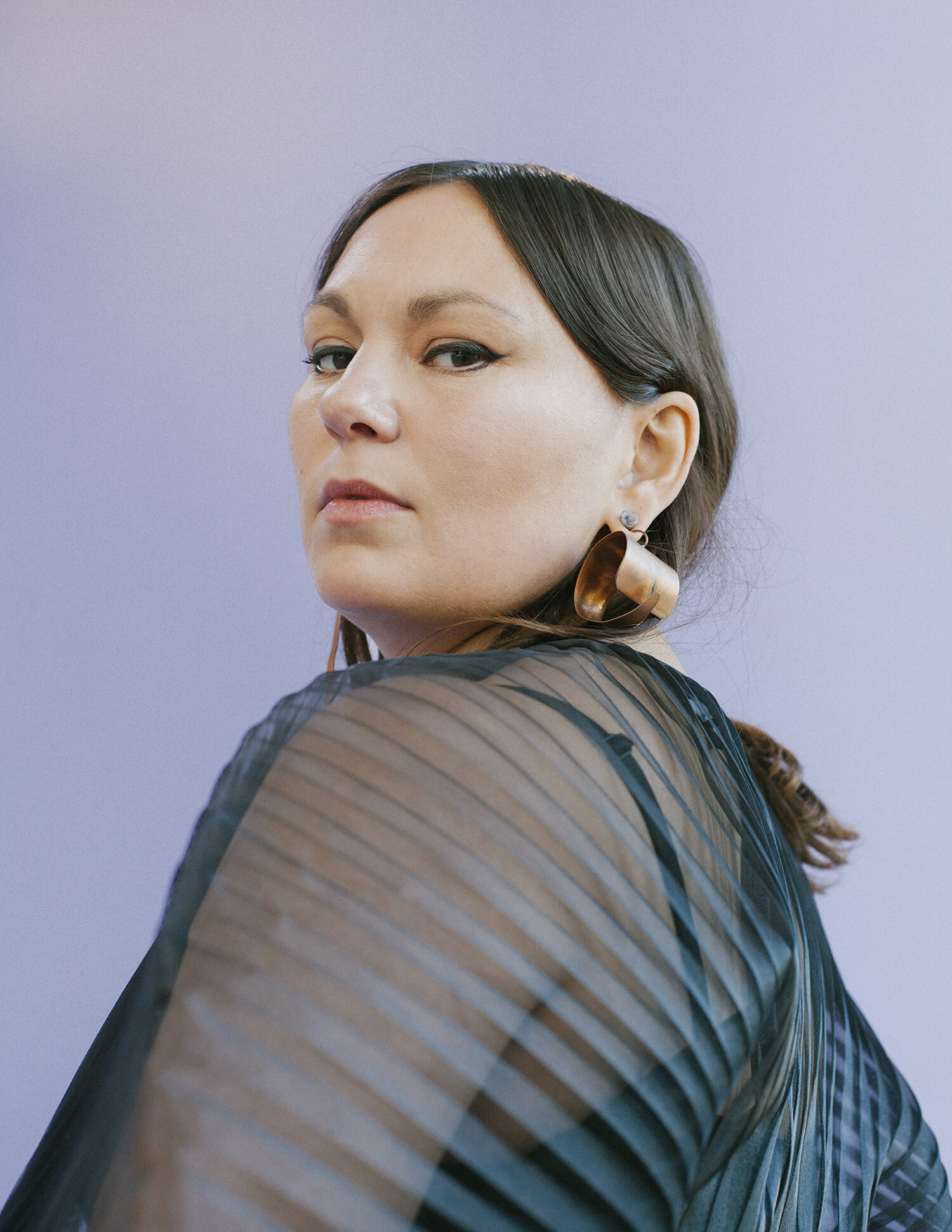 Tanya Tagaq is an improvisational singer, avant-garde composer, activist, and author. The Inuk throat singer is unapologetic in her advocacy for Indigenous Peoples. Tagaq is a member of the Order of Canada, Polaris Music Prize winner (2014’s Animism), JUNO Award winner (Animism and 2017’s ballet Going Home Star: Truth and Reconciliation by Christos Hatzis), and recipient of honorary doctorates. She has collaborated with Buffy Sainte-Marie, Björk, the Halluci Nation (formerly A Tribe Called Red), and Saul Williams.
Tanya Tagaq is an improvisational singer, avant-garde composer, activist, and author. The Inuk throat singer is unapologetic in her advocacy for Indigenous Peoples. Tagaq is a member of the Order of Canada, Polaris Music Prize winner (2014’s Animism), JUNO Award winner (Animism and 2017’s ballet Going Home Star: Truth and Reconciliation by Christos Hatzis), and recipient of honorary doctorates. She has collaborated with Buffy Sainte-Marie, Björk, the Halluci Nation (formerly A Tribe Called Red), and Saul Williams.
Image and bio source:
Tagaq, T. (n.d.). Tanya Tagaq. Tanya Tagaq website. https://www.tanyatagaq.com/
Tate, Jerod Impichchaachaaha' (Chickasaw)
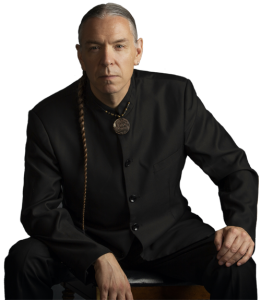
Jerod Impichchaachaaha’ Tate is a classical composer with a focus on the continuation of American Indian classical composing. Tate has worked with the music and languages of various tribes, including his own, Chickasaw. His work has been performed at Carnegie Hall and the Lincoln Center, among others. Tate has collaborated with or composed for the New York Philharmonic, Turtle Island String Quartet, Melody McKiver (Obishikokaang Lac Seul First Nation), the string quartet ETHEL, American Composers Orchestra. National Symphony Orchestra, San Francisco Orchestra and Chorus, and Dallas Symphony Orchestra, to name a few. Tate was also the founding composition instructor for Chickasaw Summer Arts Academy and has taught at reservations in the U.S. and Canada.
Image and bio source:
Tate, J. (2023). Jerod Impichchaachaaha’ tate. Jerod Impichchaachaaha Tate website. https://jerodtate.com/

Fawn Wood draws from her Cree round dance and powwow and Salish chant music traditions to create her unique style. Her father, Earl Wood, is a founding member of Northern Cree. She has collaborated with R. Carlos Nakai, Tony Duncan, Randy Wood, Kevin Yazzie, and more. She was the first female to win the Hand Drum contest at the Gathering of Nations Powwow in 2006 and had performed and won awards in the Native American Music Awards (NAMMYS) and Aboriginal Peoples’ Choice Music Awards.
Bio and image source:
Fawn Wood. Buffalo Jump Records. (2021, November 23).
Wray, Link (Shawnee) (1929-2005)
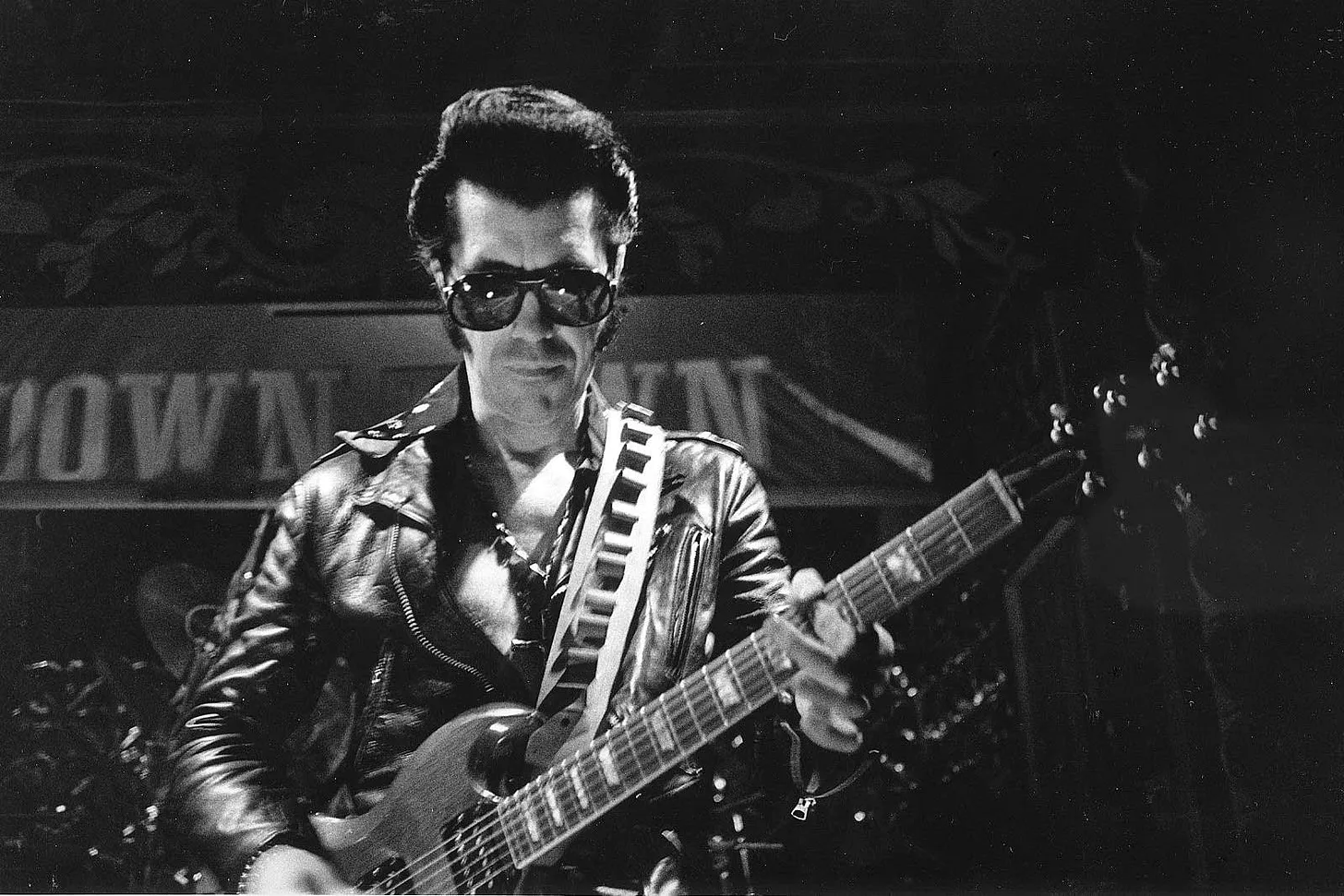
Link Wray is best known for his instrumental single hit, “Rumble,” from 1958. The recognizable guitar riff played by Wray left a larger mark on rock'n'roll than is often acknowledged; there was rock’n’roll guitar before “Rumble” and after. Guitarists Jimmy Page and Pete Townshend cite Wray as an early influence for them. He was also featured in the documentary Rumble: Indians who Rocked the World.
Bio source:
Fricke, D. (n.d.). Link Wray: The Lifelong Journeyman’s Incendiary Sound Set the Standard for Rock & Roll Guitar. Rock & Roll Hall of Fame. https://rockhall.com/wp-content/uploads/2024/03/Link_Wray_Induction_Essay.pdf (Please copy and paste URL into a browser).
Image source:
Stegall, T. N. (2023, November 23). Parade of great guitarists: Link wray. Parade Of Great Guitarists: Link Wray. https://timnapalmstegall.substack.com/p/parade-of-great-guitarists-link-wray